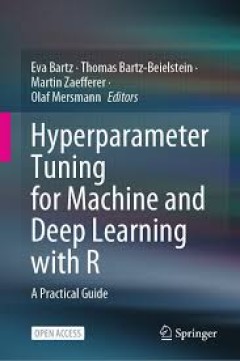Filter by

Introduction to Scientific Programming with Python
This open access book offers an initial introduction to programming for scientific and computational applications using the Python programming language. The presentation style is compact and example-based, making it suitable for students and researchers with little or no prior experience in programming. The book uses relevant examples from mathematics and the natural sciences to present pr…
- Edition
- 1
- ISBN/ISSN
- 978-3-030-50356-7
- Collation
- -
- Series Title
- Simula SpringerBriefs on Computing
- Call Number
- -

Handbook of Contact Mechanics = Exact Solutions of Axisymmetric Contact Problems
This open access book contains a structured collection of the complete solutions of all essential axisymmetric contact problems. Based on a systematic distinction regarding the type of contact, the regime of friction and the contact geometry, a multitude of technically relevant contact problems from mechanical engineering, the automotive industry and medical engineering are discussed. In additi…
- Edition
- 1
- ISBN/ISSN
- 9783662587096
- Collation
- XVI, 347 ill; lamp
- Series Title
- -
- Call Number
- -

Stoßprobleme in Physik, Technik und Medizin
Dieses Open Access Buch widmet sich dem Problem der Mechanik des Zusammenstoßes zweier makroskopischer Körper. Falls die Dynamik der Körper als Ganzes dies erlaubt, ohne in unüberschaubare Komplexität zu verfallen (in der Regel ist das nur für das reine Normalstoßproblem der Fall), werden allgemeine axialsymmetrische Stoßpartner betrachtet. Für das allgemeine räumliche Stoßproblem wi…
- Edition
- 1
- ISBN/ISSN
- 9783662602966
- Collation
- XV, 241 hlm; ill., lamp.,
- Series Title
- -
- Call Number
- -

Making Presentation Math Computable
This Open-Access-book addresses the issue of translating mathematical expressions from LaTeX to the syntax of Computer Algebra Systems (CAS). Over the past decades, especially in the domain of Sciences, Technology, Engineering, and Mathematics (STEM), LaTeX has become the de-facto standard to typeset mathematical formulae in publications. Since scientists are generally required to publish their…
- Edition
- 1
- ISBN/ISSN
- -
- Collation
- XVIII, 197
- Series Title
- -
- Call Number
- XVIII, 197

META-NET Strategic Research Agenda for Multilingual Europe 2020
In everyday communication, Europe’s citizens, business partners and politicians are inevitably confronted with language barriers. Language technology has the potential to overcome these barriers and to provide innovative interfaces to technologies and knowledge. This document presents a Strategic Research Agenda for Multilingual Europe 2020. The agenda was prepared by META-NET, a European Net…
- Edition
- -
- ISBN/ISSN
- 978-3-642-36349-8
- Collation
- VIII, 87
- Series Title
- White Paper Series (META)
- Call Number
- -

Space–Time Conservation Element and Solution Element Method : Advances and …
This open access book introduces the fundamentals of the space–time conservation element and solution element (CESE) method, which is a novel numerical approach for solving equations of physical conservation laws. It highlights the recent progress to establish various improved CESE schemes and its engineering applications. With attractive accuracy, efficiency, and robustness, the CESE method …
- Edition
- 1
- ISBN/ISSN
- 9789819908769
- Collation
- IX, 139 hlm,: ill, lamp;
- Series Title
- 13
- Call Number
- -

Hyperparameter Tuning for Machine and Deep Learning with R
This open access book provides a wealth of hands-on examples that illustrate how hyperparameter tuning can be applied in practice and gives deep insights into the working mechanisms of machine learning (ML) and deep learning (DL) methods. The aim of the book is to equip readers with the ability to achieve better results with significantly less time, costs, effort and resources using the methods…
- Edition
- 1
- ISBN/ISSN
- -
- Collation
- -
- Series Title
- -
- Call Number
- XVII, 323

Programming for Computations - Python: A Gentle Introduction to Numerical Sim…
This book presents computer programming as a key method for solving mathematical problems. There are two versions of the book, one for MATLAB and one for Python. The book was inspired by the Springer book TCSE 6: A Primer on Scientific Programming with Python (by Langtangen), but the style is more accessible and concise, in keeping with the needs of engineering students. The book outlines th…
- Edition
- -
- ISBN/ISSN
- 978-3-030-16877-3
- Collation
- XVI, 232
- Series Title
- -
- Call Number
- -

Finite Difference Computing with PDEs: A Modern Software Approach
This book is open access under a CC BY 4.0 license. This easy-to-read book introduces the basics of solving partial differential equations by means of finite difference methods. Unlike many of the traditional academic works on the topic, this book was written for practitioners. Accordingly, it especially addresses: the construction of finite difference schemes, formulation and implementation…
- Edition
- -
- ISBN/ISSN
- 9783319554563
- Collation
- XXIII, 507
- Series Title
- -
- Call Number
- -

Programming for Computations - MATLAB/Octave: A Gentle Introduction to Numeri…
This book presents computer programming as a key method for solving mathematical problems. There are two versions of the book, one for MATLAB and one for Python. The book was inspired by the Springer book TCSE 6: A Primer on Scientific Programming with Python (by Langtangen), but the style is more accessible and concise, in keeping with the needs of engineering students. The book outlines the s…
- Edition
- -
- ISBN/ISSN
- 9783319324524
- Collation
- XVI, 216
- Series Title
- -
- Call Number
- -
 Computer Science, Information & General Works
Computer Science, Information & General Works  Philosophy & Psychology
Philosophy & Psychology  Religion
Religion  Social Sciences
Social Sciences  Language
Language  Pure Science
Pure Science  Applied Sciences
Applied Sciences  Art & Recreation
Art & Recreation  Literature
Literature  History & Geography
History & Geography